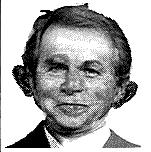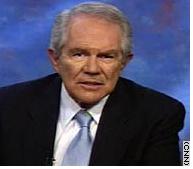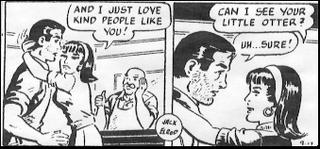I've been willing to give John Roberts the benefit of the doubt, because the man's positives seem pretty strong and the negatives are largely speculative. He has a first-rate mind, a judicial temperament, and as far as we know, he hasn't rented any
Long Dong Silver videos.
I respect his Catholic faith and beliefs regarding abortion. And I firmly believe individuals are obligated to act upon their moral convictions — just not when their professional responsibilities require acting otherwise. Then, the ethical response is to resign or decline to participate and accept the consequences.
Still, there are some reasons I'm concerned that Roberts's personal beliefs may yet turn up, Scalia-like, in his judicial opinions. Like a lot of brilliant characters, he seems to be quick to judge people, including entire categories of people.
Now maybe he has mellowed since marrying Jane Sullivan, who was part of the first class of women to enter Holy Cross, where men like her future husband had "opposed the decision to integrate, so the women who chose to go there were seen as pathbreakers, pioneers walking into sometimes uncomfortable territory," according to the
Washington Post. But that's wishful thinking. The couple, who didn't marry until the prime childbearing years had passed, appear to have been devoted careerists. Jane Roberts has been called a feminist by Phyllis Schlafly, president of the conservative Eagle Forum, although her record of feminist engagement — a few years on Board of
Feminists for Life — seems very sketchy compared to her devotion to
satellite law and
the Catholic Church.
The rightward
Washington Times reports on the nominee's resistance to admitting girls to his all-boys high school:
"I tend to think that the presence of the opposite sex in the classroom will be confining rather than catholicizing," [Roberts] wrote. "I would prefer to discuss Shakespeare's double entendre and the latus rectum of conic sections without a [b]londe giggling and blushing behind me."
"Game times should be interesting too," Judge Roberts, then a junior at the Catholic lay-teacher school, wrote in the Torch, the school's newspaper. "Imagine the five cheerleaders on the sidelines, with block "L's" on their chests, screaming, "Give me a 'L'!" Give me a break!"
This undercuts any claim of sensitivity to women's rights Roberts might make based upon growing up with three sisters. Perhaps Roberts was concerned that the girls would get all the good roles, like
Peppermint Patty, in the school plays.
To be fair, how many of us could survive a vetting of our high school opinions? Perhaps this is just early, pre-law school evidence of what a
Bush spokesman called a great sense of humor, exhibited in this "a lawyer joke" in a memo regarding a female lawyer in his organization:
"Some might question whether encouraging homemakers to become lawyers contributes to the common good, but I suppose that is for the judges to decide."
Ho, ho.
Roberts addressed the ethics of allowing a Falls Church Girl Scout to meet the president [Reagan] in the midst of the annual cookie drive. "Elizabeth . . . has sold some 10,000 boxes and would like to sell one to the President. The little huckster thinks the President would like the Samoas," he wrote, before concluding that he had no objection to deviating in this case from the White House's practice of avoiding "an implied endorsement" by the president.
Not like some Gold Star Mother trying to talk to the president, this deviation surely served a national purpose.
The same article quotes Roberts skillfully combining ethnic political pandering, lawyer humor and a musical turn of phrase: "I think this audience would be pleased that we are trying to grant legal status to their illegal amigos."
In a January 1982 memo he wrote about legislation that he said would "heap benefits" on the Texas Band of Kickapoo Indians. Explaining their history, Roberts wrote, "The Kickapoos, originally from the Great Lakes area, did not stop running from their encounter with Europeans until they reached Mexico, where they now hold 17,000 acres of land" [Note: About 10 times the size of the holdings of the Bush clan, which fled from Connecticut] and "provide migrant labor in the U.S." Roberts said he had no legal objections to the bill, which he said was consistent with administration policy, but added that its "provisions seem overly generous — particularly in light of the fact that these are, generally speaking, Mexican Indians and not American Indians."
Not to mention, big fat chickens who ran and ran...
The new court's majority opinions should be a scream.









